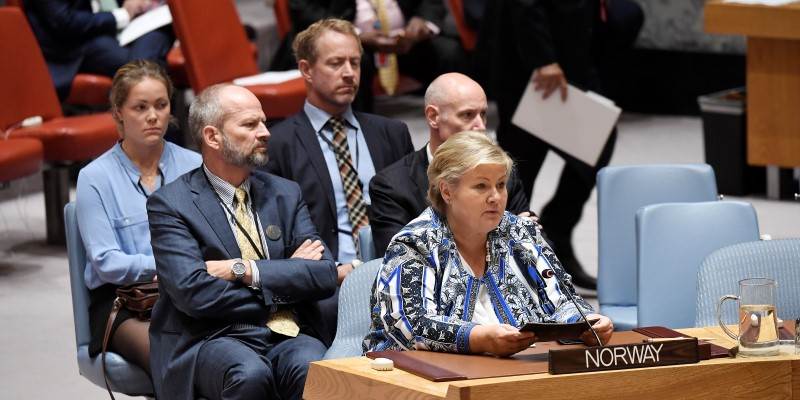Mr President,
I have the honour of speaking on behalf of the Federal Democratic Republic of Ethiopia, the Republic of Korea and my own country – Norway.
In 2014, our three countries established an informal cross-regional Group of Friends of UN Peace Operations.
The group has since been meeting regularly to facilitate dialogue on reforms.
According to the UN Refugee Agency, more than 65 million people were forcibly displaced by conflict last year – the highest number on record.
Behind those figures, there are individual men, women and children -- families that have been broken up and forced to leave their homes.
We must do what we can to prevent, solve and alleviate this immense source of human suffering.
Mr. President,
The report of the High-level Independent Panel on Peace Operations in 2015 was a milestone in our efforts to make peace operations more agile and effective.
Together with other recent reviews, the report presents a coherent set of recommendations to adapt UN peace operations to the increasingly complex realities of the field.
I would like to highlight three areas where the Security Council can engage, working in close dialogue with the Secretariat, troop and police contributing countries and host states:
First,
The search for political solutions should guide the design and deployment of all peace operations.
Security Council members must strive to overcome their own differences, in order to maximise the Council’s political leverage.
Only then can we expect genuine engagement from political leaders and parties to conflict.
But, ultimately, no outside engagement can be a substitute for genuine political will from the leaders of the countries themselves.
Second,
The UN cannot and should not go alone.
In these times of rapid and profound changes in the global security landscape, we need a strong global peace and security architecture, led by the UN, working in close partnerships with regional and sub-regional organisations.
In particular, we welcome the new strategic partnership between the UN and the AU.
We encourage the Security Council to make the most out of its relationship with the AU Peace and Security Council.
It is urgent to agree on a more predictable system for financial and other support to AU-led operations.
There will be no lasting peace in Somalia or the Sahel region if AMISOM or the G5 Sahel force is not adequately financed and supported.
Third,
The litmus test of our efforts should be more effective delivery in the field.
That must include more active engagement with local communities – not least with women.
Effective peace operations depend on the UN’s ability to deliver as one, often in difficult environments.
We are therefore greatly encouraged by the Secretary-General’s initiative to overhaul the UN’s management system to build unity and efficiency across the system.
Priority should be given to ensuring the safety and security of the personnel we deploy to the field on our behalf.
Mr President,
We are pleased that Secretary-General Guterres has made continued reform a cornerstone of his agenda, building on the framework of the reviews.
You can count on the continued support of Ethiopia, Norway and the Republic of Korea, as well as other ‘Friends of UN Peace Operations’.
We will keep pressing for change, to allow UN peace operations to fulfil their true potential.
We are convinced that the only forward is by working together – focusing on what unites us, rather than on what divides us.
Thank you.
